A list of famous Europeans.
Founding Fathers of the European Union

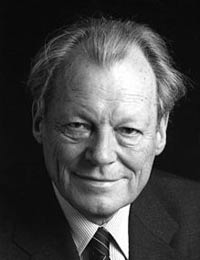 Willy Brandt (1913-1992) German politician and statesman. Opposed to Hitler, he fled to Norway. After WWII he became Mayor of Berlin playing a vital role to defuse tensions during the Cold War stand-off with the Soviet Union. Became Chancellor of Germany in 1979, made a famous gesture of reconciliation to victims of Nazi Germany at Warsaw. He sought rapprochement with the East and creating a stronger, united Europe.
Willy Brandt (1913-1992) German politician and statesman. Opposed to Hitler, he fled to Norway. After WWII he became Mayor of Berlin playing a vital role to defuse tensions during the Cold War stand-off with the Soviet Union. Became Chancellor of Germany in 1979, made a famous gesture of reconciliation to victims of Nazi Germany at Warsaw. He sought rapprochement with the East and creating a stronger, united Europe.




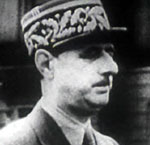 Charles de Gaulle (1890 – 1970) Under de Gaulle’s presidency, France became a member of the EEC, and de Gaulle spoke enthusiastically about a European federation. However, de Gaulle partly saw the EEC as an antidote to the US, and de Gaulle blocked the UK’s admission. However, he did help cement better relations with Germany.
Charles de Gaulle (1890 – 1970) Under de Gaulle’s presidency, France became a member of the EEC, and de Gaulle spoke enthusiastically about a European federation. However, de Gaulle partly saw the EEC as an antidote to the US, and de Gaulle blocked the UK’s admission. However, he did help cement better relations with Germany.
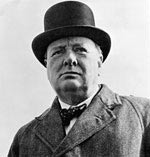 Winston Churchill (1874 – 1965) Churchill led resistance to Nazi Germany and contributed to the liberation of Europe. In 1946, he made a speech calling for a united Europe. ‘We must build a kind of United States of Europe.’ However, Churchill did not envisage the UK as part of Europe.
Winston Churchill (1874 – 1965) Churchill led resistance to Nazi Germany and contributed to the liberation of Europe. In 1946, he made a speech calling for a united Europe. ‘We must build a kind of United States of Europe.’ However, Churchill did not envisage the UK as part of Europe.
European Revolutionaries
 Napoleon Bonaparte (1769 – 1821) – French military and political leader. Napoleon revolutionised Europe. He cemented the ideas of the French revolution (in his own autocratic style) and enabled these ideas, and his Napoleonic code to be spread across Europe.
Napoleon Bonaparte (1769 – 1821) – French military and political leader. Napoleon revolutionised Europe. He cemented the ideas of the French revolution (in his own autocratic style) and enabled these ideas, and his Napoleonic code to be spread across Europe.
Giuseppe Mazzini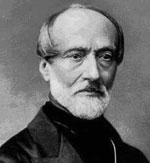 (1805-1872) Italian political activist. Campaigned for a united Republic of Italy. Mazzini supported several insurrections against the foreign rule of Italian states. He played a key role in cementing support for a united Italy.
(1805-1872) Italian political activist. Campaigned for a united Republic of Italy. Mazzini supported several insurrections against the foreign rule of Italian states. He played a key role in cementing support for a united Italy.
Mazzini also supported initiatives for European wide federation.
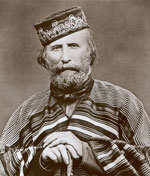 Giuseppe Garibaldi (1807-1882) – National hero of Italy. Garibaldi led volunteer army in the Italian Wars of Independence. He played a key role in uniting Italy. He also fought in Latin America and became known as ‘The Hero of Two Worlds’
Giuseppe Garibaldi (1807-1882) – National hero of Italy. Garibaldi led volunteer army in the Italian Wars of Independence. He played a key role in uniting Italy. He also fought in Latin America and became known as ‘The Hero of Two Worlds’
 V.Lenin (1870-1924) – Leader of Russian Revolution in 1917. He masterminded the Bolshevik revolution and became the first leader of the Soviet Union.
V.Lenin (1870-1924) – Leader of Russian Revolution in 1917. He masterminded the Bolshevik revolution and became the first leader of the Soviet Union.
 Mikhail Gorbachev (1931 – ) Russian President during the end of the Cold War. Gorbachev initiated a policy of Glasnost and Perestroika. These policies of reform and openness led to the ending of Communist party rule in the Soviet Union, and the fall of the Berlin wall. In a short space of time, Eastern European countries attained freedom and democracy, allowing Eastern Europe to become part of the European Union.
Mikhail Gorbachev (1931 – ) Russian President during the end of the Cold War. Gorbachev initiated a policy of Glasnost and Perestroika. These policies of reform and openness led to the ending of Communist party rule in the Soviet Union, and the fall of the Berlin wall. In a short space of time, Eastern European countries attained freedom and democracy, allowing Eastern Europe to become part of the European Union.
Famous European Women


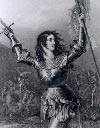 Joan of Arc – (1412-1431) – French peasant girl who inspired the French Dauphin to renew the French fight against occupying English forces. Seven years after death, as she had predicted, the English were defeated.
Joan of Arc – (1412-1431) – French peasant girl who inspired the French Dauphin to renew the French fight against occupying English forces. Seven years after death, as she had predicted, the English were defeated.


European Philosophers
 John Locke (1632-1704) John Locke made important contributions to the theory of liberal democracy. In his “The two treatises of the government” Locke argued that a government’s right to rule must be based on the consent of its people. Locke emphasised the idea of a ‘social contract’ – power sanctioned by the people. Locke also emphasised that all men were equal – at a time when societies were very hierarchical.
John Locke (1632-1704) John Locke made important contributions to the theory of liberal democracy. In his “The two treatises of the government” Locke argued that a government’s right to rule must be based on the consent of its people. Locke emphasised the idea of a ‘social contract’ – power sanctioned by the people. Locke also emphasised that all men were equal – at a time when societies were very hierarchical.
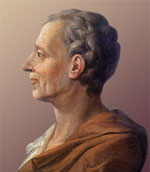 Baron de Montesquieu (1689 – 1755) French philosopher. Montesquieu was a key figure in the Enlightenment. Montesquieu wrote on political theory, advocating a ‘separation of powers’ and other democratic principles. In his The Spirit of the Laws (1748), he distinguished democracy from other types of government.
Baron de Montesquieu (1689 – 1755) French philosopher. Montesquieu was a key figure in the Enlightenment. Montesquieu wrote on political theory, advocating a ‘separation of powers’ and other democratic principles. In his The Spirit of the Laws (1748), he distinguished democracy from other types of government.
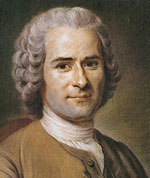 Jean Jacques Rousseau (1712 – 1778) Rousseau was a Genevan philosopher who wrote the Social Contract – an influential political tract which argued for government through representation – ideally through direct democracy. Rousseau’s democratic ideals were influential in the French Revolution.
Jean Jacques Rousseau (1712 – 1778) Rousseau was a Genevan philosopher who wrote the Social Contract – an influential political tract which argued for government through representation – ideally through direct democracy. Rousseau’s democratic ideals were influential in the French Revolution.
 Thomas Paine (1737- 1809 ) English-American philosopher. Thomas Paine was an influential writer who powerfully argued for democratic republican government. Paine’s writings were influential in inspiring the American revolution. Paine wanted to see an end to executive tyranny and felt the extension of political power to all was the best way to achieve this.
Thomas Paine (1737- 1809 ) English-American philosopher. Thomas Paine was an influential writer who powerfully argued for democratic republican government. Paine’s writings were influential in inspiring the American revolution. Paine wanted to see an end to executive tyranny and felt the extension of political power to all was the best way to achieve this.
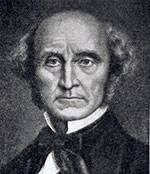 J.S. Mill (1806-1873) John Stuart Mill was a leading liberal philosopher of the Nineteenth Century. He argued for universal suffrage (extending the vote to women and all classes of people) Mill also expounded the principle of liberty – which is an important principle of liberal democracy. His pamphlet The Subjection of Women (1861) was important for raising the issue of votes for women.
J.S. Mill (1806-1873) John Stuart Mill was a leading liberal philosopher of the Nineteenth Century. He argued for universal suffrage (extending the vote to women and all classes of people) Mill also expounded the principle of liberty – which is an important principle of liberal democracy. His pamphlet The Subjection of Women (1861) was important for raising the issue of votes for women.
Citation: Pettinger, Tejvan. “Famous Europeans”, Oxford, biographyonline.net, 07/08/2013. Updated 26 January 2018.
Europe – a history. A historical narrative that stretches from the Ice Age to the Atomic Age, by Norman Davies at Amazon
Other Famous Europeans
Jacques Delors (1925 – ) French economist and politician. Served as eighth President of the EU. A key architect of the European single currency.
Mrs Thatcher – British Prime Minister from 1979 to 1990. Mrs Thatcher was known for her Euro-scepticism and arguments with Jacques Delors. But, she still signed the Single European Act of 1987, which extended the powers of the EC.
Adolf Hitler (1889-1945) – German dictator 1933-1935
Benito Mussolini (1883-1945) – Fascist dictator of Italy
See also

 Artists – A list of the great artists, including Leonardo da Vinci, Claude Monet, Vincent Van Gogh, Pablo Picasso, Michelangelo and Rembrandt.
Artists – A list of the great artists, including Leonardo da Vinci, Claude Monet, Vincent Van Gogh, Pablo Picasso, Michelangelo and Rembrandt.



